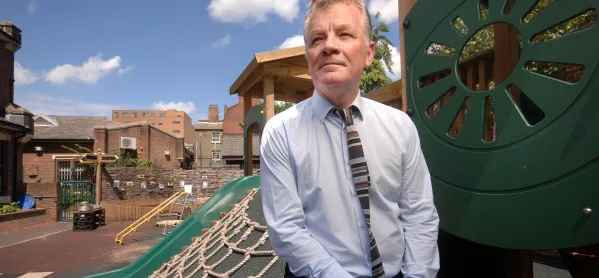Exclusive: No plan to replace catch-up tsar, admits DfE

The government has no plans to replace Sir Kevan Collins as education recovery commissioner, Tes can reveal.
Instead, the Department for Education (DfE) has said it will engage with the sector on its catch-up package on an ongoing basis.
The admission from the DfE comes as heads’ and teachers’ leaders express fears that catch-up is in danger of being “relegated” by the government in the upcoming spending review.
Covid: Catch-up effort ‘a bit feeble’, says former recovery tsar
Exclusive: Sir Kevan Collins resigns over catch-up plan
Background: No extended school day in new £1.4bn catch-up plan
Education secretary Gavin Williamson previously hinted that his department could “do more” for Covid recovery if the review was favourable to the DfE’s budget.
Sir Kevan, who was formerly chief of the Education Endowment Foundation (EEF), was appointed as recovery tsar for an initial nine-month spell in February 2021, with an option for an additional term of equal length to follow.
He was tasked with overseeing the creation of a plan to help pupils recover after two periods of mass school closures sparked by the Covid pandemic.
But he resigned after just four months when the government’s catch-up package fell far short of the £15 billion he had sought to fund the recovery effort.
Fears over Covid catch-up funding for schools
Offering his resignation to Boris Johnson in a letter first published by Tes, Sir Kevan said he did “not believe” that a “successful recovery” could be achieved with the £1.4 billion package on offer.
He later said the approach to the issue had been “a bit feeble” and that a “massive national effort” was now required.
And government officials went on to admit that the management of the Covid catch-up plan could “have been done better”.
Asked by Tes if Sir Kevan would be replaced, the DfE said it had no plans to appoint a new education recovery commissioner at this stage.
Instead, it said it would continue to consult with education stakeholders on its catch-up plan.
The DfE also pointed to the fact that it had commissioned Renaissance Learning, an independent research and assessment agency, to provide a baseline assessment of pupils’ catch-up needs and monitor progress over the course of the year.
Heads’ leaders told Tes they hoped the government’s decision not to replace Sir Kevan did not mean that it had “relegated the importance of education recovery”, warning that the existing catch-up package was “too narrow in scope” and lacking in a “sufficient level of investment”.
Geoff Barton, general secretary of the Association of School and College Leaders, added that the government needed to invest in a “far more ambitious” catch-up offer.
“We hope the decision not to replace Sir Kevan does not mean that the government has relegated the importance of education recovery,” he said.
“It is mistaken if it thinks that the job has been done through the recovery package so far announced, which is too narrow in scope and lacks a sufficient level of investment.
“It must initiate a far more ambitious programme which gives schools and colleges more resources and flexibility to target support according to the needs of their pupils, and particularly those from disadvantaged backgrounds.”
He added: “The pandemic and the disruption caused to education over the past 18 months has had a devastating impact on both the learning and the mental health and wellbeing of many children and young people.
“The government must make it a priority in its spending review to do the right thing for these young people.”
Mary Bousted, joint general secretary of the NEU teaching union, also said today - at an event lobbying for greater school funding - that the spending review will be a “test of the prime minister’s rhetoric” about “education recovery being ‘the biggest priority’ for his government”.
“To date, ministers have only allocated a small fraction of the £15 billion judged to be needed by the government’s former education recovery tsar to repair the damage done to children and young people by the pandemic,” she said.
“If the government is serious about making sure no child is left behind, they will show far more urgency and ambition to support and resource schools with their efforts to deliver education recovery.”
Paul Whiteman, general secretary of the NAHT school leaders’ union, said: “Sir Kevan Collins made his case for significant additional recovery funding for schools and left his post when the government signalled that they were unwilling to meet his estimation of what schools needed.
“A number of organisations, including ourselves, have made the case for the sum of money needed to be around £15 billion and whether or not the government replaces Sir Kevan, the important thing is that it demonstrates through its actions that it is serious about the recovery mission that schools are engaged in.”
Mr Whiteman said to do this the government needed to develop a “radically more ambitious” plan for investment in Covid education recovery than it has produced so far.
Concerns over the government’s commitment to Covid education recovery follow a statement from the Treasury yesterday about the new health and social care levy, which said that “core day-to-day departmental spending will follow the path set out at the spring budget earlier this year.”
You need a Tes subscription to read this article
Subscribe now to read this article and get other subscriber-only content:
- Unlimited access to all Tes magazine content
- Exclusive subscriber-only stories
- Award-winning email newsletters
Already a subscriber? Log in
You need a subscription to read this article
Subscribe now to read this article and get other subscriber-only content, including:
- Unlimited access to all Tes magazine content
- Exclusive subscriber-only stories
- Award-winning email newsletters
topics in this article



